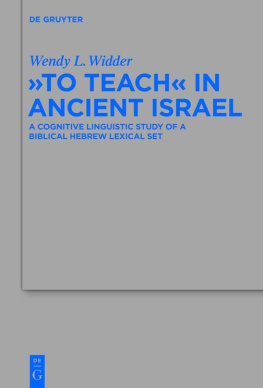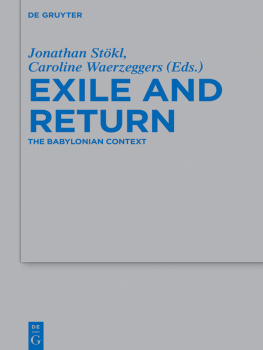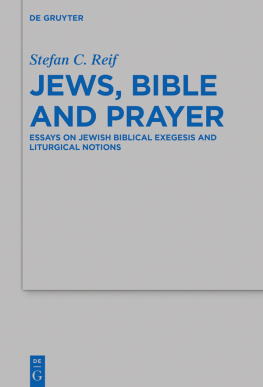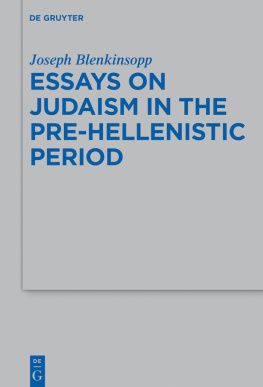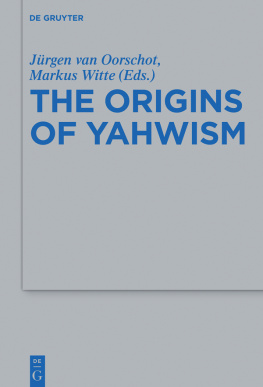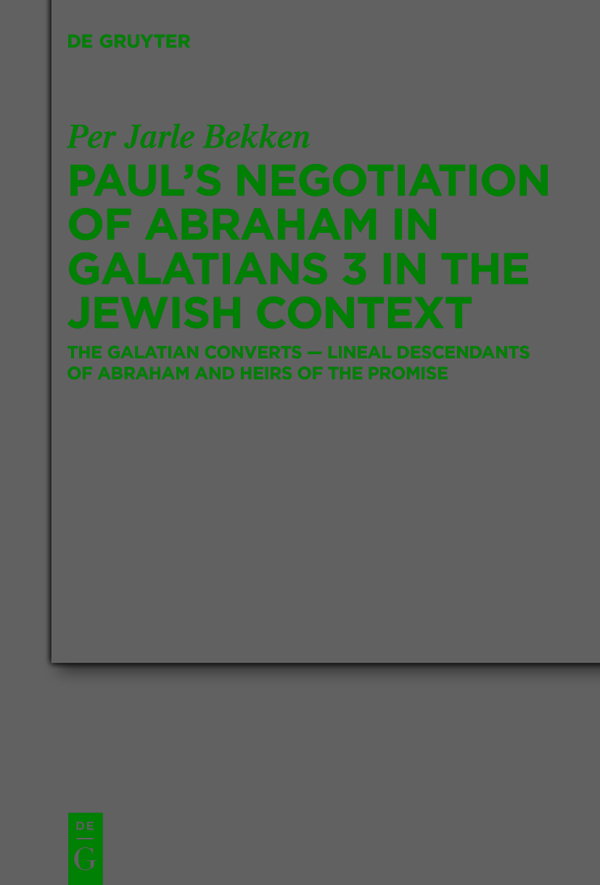Beihefte zur Zeitschrift fr die neutestamentliche Wissenschaft
Edited by
Matthias Konradt
Judith Lieu
Laura Nasrallah
Jens Schrter
Gregory Sterling
Volume
ISBN 9783110721928
e-ISBN (PDF) 9783110722109
e-ISBN (EPUB) 9783110722178
Bibliographic information published by the Deutsche Nationalbibliothek
The Deutsche Nationalbibliothek lists this publication in the Deutsche Nationalbibliografie; detailed bibliographic data are available on the Internet at http://dnb.dnb.de.
2021 Walter de Gruyter GmbH, Berlin/Boston
Dedicated to the memory of my late parents, Erna Johanne and Gunnar Bekken
Acknowledgments
There are persons and institutions I owe thanks and acknowledgments for their support during the completion of this book. I am grateful to the Faculty of Education and Arts, Nord University, for having granted me research time to bring this book to an end. Thanks are also due to the librarians at Nord University in Bod and Levanger, who have provided helpful services. I also thank Tyndale House, that made it possible for me to spend the spring 2016 and two months in 2018 in Cambridge as a Visiting Professor. A special thanks to the library staff of Tyndale House for their kind assistance.
I would also like to thank Professors Sigurd Grindheim, A. Andrew Das, and the members of the Philo and Early Christianity seminar, SNTS, for valuable comments on various parts of the work. I am grateful to Professor Thomas Kazen (University College, Stockholm) for inviting me to present a paper in his doctoral seminar in September 2019. I owe special thanks to the Publisher De Gruyter due to the constructive criticism and helpful remarks provided during the peer review process. Any flaws or shortcomings are my responsibility.
I am once again grateful to Dr. Brian McNeil, who has revised my English.
Last but by no means least, I thank Editorial Director Dr. Albrecht Dhnert, for accepting my work for publication in the prestigious series BZNW, and Acquisitions Editor Alice Meroz, for her kind support during the production of this book.
I dedicate this book to the memory of my late parents, Erna Johanne and Gunnar Bekken, for the love and encouragement they always offered.
Levanger, January 2021
Per Jarle Bekken
Chapter 1: Introduction
The Thesis of this Study
Samuel Sandmel once wrote about Philos interpretation of Abraham: To see what the writer makes of Abraham is often to see most clearly what the writer is trying to say. particularly evident in Philos writings, in which the figure of Abraham was conceived as an authoritative norm relative to the law of Moses. I shall now investigate the constituents of such a Jewish referential background in and behind Galatians 3, and this study leads to the following main conclusions:
1. Gal 3:629 provides a small exegetical treatise, in which words from the main quotation of Gen 15:6 and from other subordinate biblical passages have been given an exegetical paraphrase throughout the passage. Paul follows a conventional method of Jewish exegesis, in which phrases from the biblical quotation may be omitted or replaced and supplemented by other interpretative terms or otherwise combined with various exegetical traditions. Such exegetical traditions may be identified either as exegetical motifs or as a cluster of other biblical passages, i.e., exegetical explanations that deviate from the Hebrew Bible itself, or a conjunction of biblical passages that appear regularly together and can be found to be deployed in different writings by other ancient authors who belong to an authors cultural context. Moreover, parallels in Philo and other Jewish data also suggest that Paul has cast his exegetical argument into conventional forms in terms of exegetical structures and terminology of his own day.
2. The Galatian converts had experienced that God had granted the Spirit and worked manifestations of power in them when they came to trust in God. At this juncture, Paul applies the exegetical motifs, in which Gen 15:6 is interpreted about Abrahams reception of the Spirit and his experience of being transformed by God in a context in which Abraham is characterized as the paradigmatic proselyte. By comparing the experience of the Galatian converts to this crucial event in Abrahams life, Paul ascribed to the Galatians the status of being approved by God as Jewish proselytes apart from circumcision and a way of life under the jurisdiction of the Law. This assertion was most probably developed in an intramural debate with Pauls opponents, who draw the opposite conclusion from the same exegetical motif and data, namely, that the mode of conversion based on the paradigm of Abraham implied that the Galatian converts needed to be circumcised and become adherents to the commandments of the Law of Moses.
3. Furthermore, the experience of becoming a Jewish proselyte under the same scriptural terms as Abraham meant that Abraham was not merely a model, but was also conceived as the father of the Jewish converts. Thus, Paul insists that the non-Jews as Jewish converts, and not without regard to their conversion, inherit the status of being incorporated into the lineage of Abraham, identified as , that is, the fundamental virtue of piety that defined their father Abraham. As for Pauls conception of the converts as being descended from Abraham, a comparison with Philo and rabbinic data shows they all were sensitive to the converts foreign lineage, but tried to solve this predicament in different ways. Philo, who never crafts a new genealogy for the proselytes, rather turns to the notions of spiritual and civic kinship as superior to biological ancestry, in order to claim for the Jewish proselytes the status as citizens within the Jewish politeia, who thus were ascribed equal rights and could live in fellowship with Jews on the basis of common virtues that the particular laws of Moses are meant to promote. In contrast to Philo, both Paul, and later on, some rabbis resort to a view that considered the converts as adherents of Abrahams God, and therefore already legitimate lineage of Abraham.
4. Pauls exegetical paraphrase of Gen 15:6 is fused together with words from other Genesis passages about Gods promise spoken to Abraham and his descendants. Just as the emulation of Abrahams trust in the one God was the means of marking the identity of patrilineal lineage, so too were the patriarchal promises. Thus, we can find that Paul further warrants the identity of the Galatian converts as valid descendants from Abraham by claiming their share in the promise and their blessings. Pauls conjunction of Gen 15:6 with a catena of promises from the Abrahamic narrative presupposes a specific Jewish tradition, which suggests a correspondence between the conduct of Abrahams trust and the very same conduct expected in return from God, in terms of the reward God promised through a solemn oath to Abraham and to his descendant Isaac. It is my hypothesis that a particular version of this Jewish thought pattern is evident in Philos appropriation of Abraham and presupposed by Paul. In Galatians 3, Paul argues that the granting of the Spirit to Isaacs descendants, as well as to Jewish converts, is evidence that God had demonstrated his will to keep his oath of promise; this results from the parallelism of Abrahams trust and the reward of Gods trust / faithfulness given in return. In Pauls new perspective, the promised blessing to Abraham and to his descendant is now conferred on the Jews and Gentile converts and comes to fruition as the result of the crucifixion of Christ, who is taken by Paul to be Abrahams ultimate descendant. Just as the oath of promise was originally made to Abraham (Gen 22:1618) on the ground of his conduct of trust (Gen 15:6), and later was also reiterated to his offspring (Gen 26:34), it is now conferred on Isaacs descendants, provided that they manifest the same fundamental quality attributed to their ancestors. Such a line of thought, with an analogy attested in Philos interpretation of the oath of promise in



